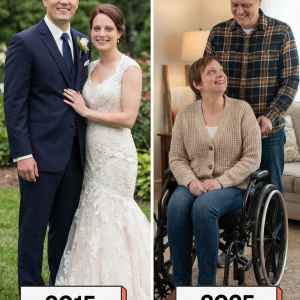I’m Cassandra Wilson, thirty-two, the planner in a family that treats planning like an optional hobby. Six months ago, I was coasting—steady software-engineering gig, tidy savings, modest Seattle rental—until the night my parents slid a thick stack of mortgage papers across the dinner table and smiled.
Portland, Oregon, was my training ground for frugality. I earned an allowance only after balancing a spreadsheet; new jeans required proof of savings. By fifteen I juggled summer jobs, and scholarships later paid most of my tuition at the University of Washington. Ramen did the rest.
My sister Allison, three years younger, grew up in a parallel universe. Back-to-school shopping sprees, no-strings allowances, checks for every field trip. Whenever I asked why, Mom cooed, “Your sister’s more sensitive, Cassie. You’re naturally responsible.”
After college I moved to Seattle, climbed the tech ladder, and still drove a dent-free ’12 Toyota. Meanwhile Allison piled up majors like trading cards, took six years to graduate, and hopped from one “unfulfilling” job to the next while our parents covered rent and a $15 k credit-card spree.
By spring I’d finally saved enough for a condo down payment. When Mom invited me for lasagna on a Sunday in April, I assumed we’d toast my milestone. Instead, the china was out, Allison was absent, and a bombshell was loading in the chamber.
“Surprise!” Dad declared. “We helped Allison buy a house in West Hills—three bedrooms, panoramic view.” My wine nearly detoured through my nose; West Hills is Portland’s priciest zip code.
Then came the folder: an $800 k house, $750 k mortgage—monthly payment north of four grand. “We can’t afford the loan in retirement,” Mom said sweetly. “You’ll take it over, won’t you, sweetheart?”
The world tilted. I’d been scraping for my own starter home, and now they wanted me to bankroll Allison’s dream view. “Family helps family,” Dad lectured. “Funny,” I replied, “how help always flows one direction.”
I left dessertless. Over the next days I ignored frantic calls until Allison showed up, red-eyed: “I love that house, Cassie. Just help until I’m on my feet.” My patience snapped—ten years of “just until.” She stormed out.
Within a week Aunt Eleanor revealed the fallout: my parents had raided nearly $300 k of retirement cash for Allison’s down payment. I braced for the next shoe—and it dropped as a certified letter. They were suing me for $500 k, claiming I’d promised to repay their “investment” in my education.
Attorney Lawrence Thompson read the complaint, lifted an eyebrow. “Absurd doesn’t mean harmless,” he warned. Especially after we uncovered forged, back-dated emails supposedly proving my debt. Fraud territory.
A chance coffee-shop run-in with Allison ended badly: designer boots, a luxury purse, and a lecture about my selfishness. “Deserve” was her favorite word. “Afford” was mine.
Court day one felt like entering an alternate reality where parents sue children. Judge Katherine Martinez leaned forward. “So the alleged verbal agreement was made when Ms. Wilson was eighteen, and no one wrote it down?” Her tone sliced marble.
Dad spun tales of sacrifice until Lawrence produced scholarship records: parents’ total contribution—about five grand. Mom sobbed over Allison’s future; cross-examination revealed $375 k already funneled to my sister.
Allison’s surprise testimony sealed it: “I deserve that house.” Gasps rippled. Even she looked startled by her own words.
A week later, verdict day. The courtroom buzzed. Judge Martinez blasted the forged emails, dismissed the suit with prejudice, and ordered my parents to cover my legal fees. “Parenthood is not a cash-back investment,” she said, gavel cracking like thunder.
Victory tasted bittersweet. Two weeks on, I returned to find my apartment ransacked, “SELFISH B***H” graffiti on the wall. Nothing stolen—just fury made tangible. I filed a police report and installed better locks.
By summer’s end my parents were selling their own house to stay afloat, Allison’s mansion listed “price reduced.” Therapy became a non-negotiable line item in my budget. I closed on a cozy two-bedroom near a park—humble, but mine.
Then, in October, an email: Can we talk? At a small café, Allison appeared in thrift-store jeans. She confessed—lawsuit, apartment vandalism, everything—and slid an envelope across the table containing $200, her first restitution payment.
“I’m not ready to forgive, but I’m willing to try,” I told her. Tiny cracks of light in a long-dark hallway.
The hardest lesson wasn’t financial. It was redefining family: love that isn’t laced with respect is just control in disguise. My condo’s deed reminds me daily—standing firm can feel lonely, but it never feels wrong.





